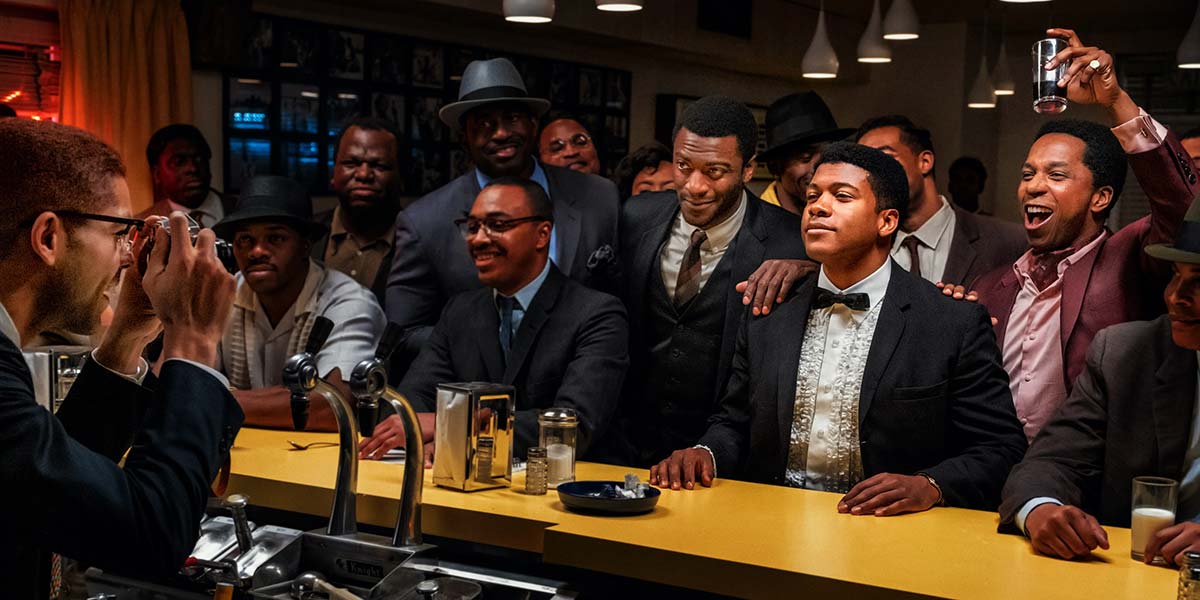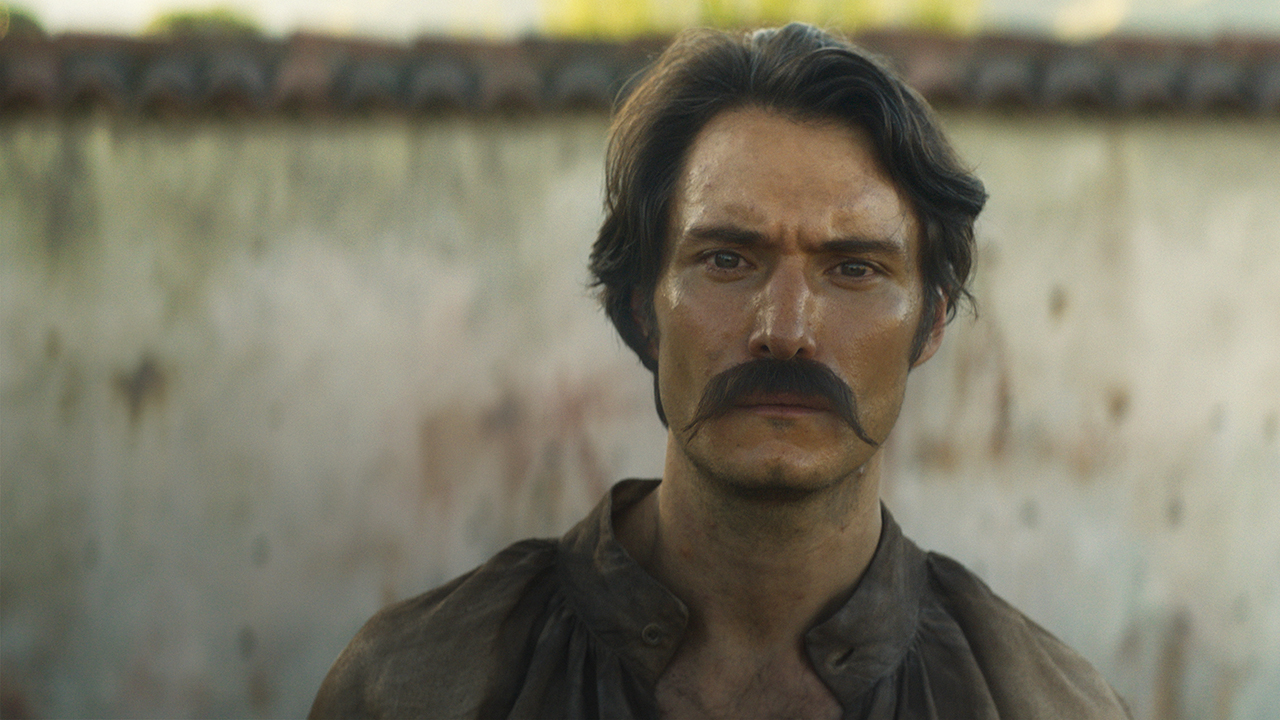Heroes get remembered, but legends never die.
Simply put, Regina King’s One Night in Miami is a fantastic feature directorial debut. After her Academy Award-winning turn in 2018’s If Beale Street Could Talk, King returns to TIFF and this time, she’s behind the camera to deliver a compelling film about four legends, adapted from Kemp Powers’s 2013 play.
One Night In Miami is based on a real evening that happened in February 1964, after 22-year-old Cassius Clay toppled Sonny Liston to become the heavyweight champion of the world. To celebrate his victory, Clay wanted to have a night on the town with his friends, Jim Brown, Sam Cooke, and Malcolm X. The play that the film is based on points out that while the four men were, in fact, friends. It makes it clear that outside of them, no one knows what conversations were had in the room where it happened.
The film expands the scope of the play from a single bedroom and kitchenette, to opening montages that introduce the legendary subjects of the film. These scenes encapsulate where the men are in their lives and the issues that color their perspectives before they enter the room. As the youngest member of the troop and newly crowned champion, Clay’s perspective is decidedly more light-hearted than the rest.
Destiny looms heavily over the room where much of the movie takes place. Clay, high on life, laments how pretty he is, all the while, contemplating his conversion to Islam. Brown is on the cusp of ending his NFL career and becoming one of Hollywood’s first black action heroes. Malcolm’s strained relationship with the Nation of Islam is ever-present throughout the film. Cooke is at the height of his career, but it’s the events of that evening that lead to a kind of spiritual conversion for the soulful crooner.
RELATED – Lift Like a Girl Review: How Hard Can You Push Someone to Become a Champion?
The most striking thing about One Night in Miami is the level of affection the men have for one another. They fight and argue like brothers, unafraid to cut deep, moments later, talking about how they admire each other. Cooke and Malcolm have the most heated exchanges, with Brown and Clay cooling their tempers. It isn’t an easy task. Their quarrel is about how to best help black people through the turbulent 60s, given the platforms they have. It’s a conversation that could be copied and pasted onto modern-day celebrities and issues facing minorities in a deeply divided America.
Malcolm says at one point “There is no room for anyone to be standing on the fence anymore. Our people are literally dying in the streets every day. Black people are dying every day and a line has got to be drawn in the sand.” Brown has to remind him at one point, “We aren’t weapons.”
As I said, the conversation could be copied and pasted onto today. The prospect that not much has changed in America threatens to make this film a singularly dour experience, but King expertly injects levity into the film to keep it from being crushed under the weight of the subjects discussed. Fans of the TV show Martin will likely recognize a line Brown (Hodge) delivers to Malcolm (Ben-Adir). Another area I was glad to see the director shine was in the fight scenes. We get at least two featuring Clay and they don’t disappoint.
The performances are another highlight of the film, with each actor capturing just the right aspects of the historical figures. Eli Goree perfectly captures the youthful exuberance and power of a 22-year-old Clay. Kingsley Ben-Adir as Malcolm vacillates between a subdued happiness, unease, and outright anger. Aldis Hodge is by far the coolest of the group, eliciting the swagger of a young Jim Brown. Leslie Odom, Jr., last, but certainly not least, has moments in the film where, if you close your eyes, he sounds exactly like Sam Cooke in terms of tone and pacing.
I think it goes without saying that I enjoyed One Night in Miami. The last bit that I’ll leave you with is that this movie delves into the origins of Sam Cooke’s anthem, “A Change Is Gonna Come.” While I consider myself a fan of Sam Cooke, I was unaware of his friendship with Malcolm X. An exchange between the two about the Bob Dylan song “Blowin’ in the Wind” added deeper context to the Spike Lee film, Malcolm X, which features the song. While I know “Change” was inspired by Dylan’s “Wind,” in my head, it’ll be the conversation with Malcolm X that was the final push Cooke needed. Within a year of this fateful night, both men were dead. King and Powers ensured that the story of their friendship will never die.
The Toronto International Film Festival is currently taking place and go through Saturday, September 19
Continue the LRM Online conversation on Discord by CLICKING HERE!
—–
Have you checked out LRM Online’s official podcast feed yet The LRM Online Podcast Network? This includes our flagship podcast Breaking Geek Radio: The Podcast, GeekScholars Movie News, and our morning show LRMornings. Check it out by listening below. It’s also available on all your favorite podcast apps!
Subscribe on: Apple Podcasts | Spotify | SoundCloud | Stitcher | Google Play

 FOR FANBOYS, BY FANBOYS
Have you checked out LRM Online’s official podcasts and videos on The Genreverse Podcast Network? Available on YouTube and all your favorite podcast apps, This multimedia empire includes The Daily CoG, Breaking Geek Radio: The Podcast, GeekScholars Movie News, Anime-Versal Review Podcast, and our Star Wars dedicated podcast The Cantina. Check it out by listening on all your favorite podcast apps, or watching on YouTube!
Subscribe on: Apple Podcasts | Spotify | SoundCloud | Stitcher | Google Play
FOR FANBOYS, BY FANBOYS
Have you checked out LRM Online’s official podcasts and videos on The Genreverse Podcast Network? Available on YouTube and all your favorite podcast apps, This multimedia empire includes The Daily CoG, Breaking Geek Radio: The Podcast, GeekScholars Movie News, Anime-Versal Review Podcast, and our Star Wars dedicated podcast The Cantina. Check it out by listening on all your favorite podcast apps, or watching on YouTube!
Subscribe on: Apple Podcasts | Spotify | SoundCloud | Stitcher | Google Play




